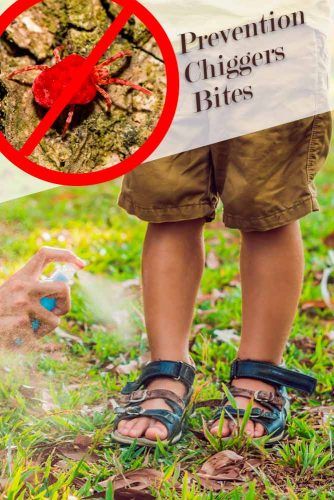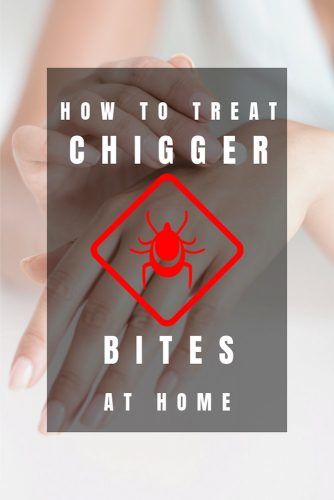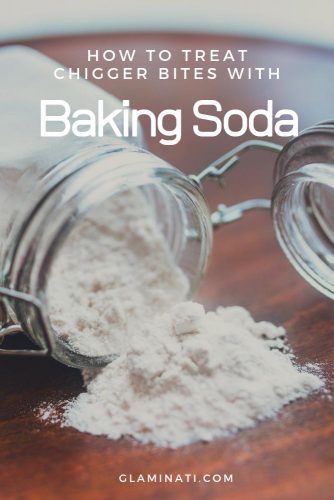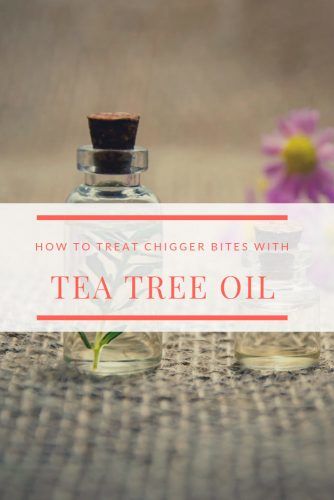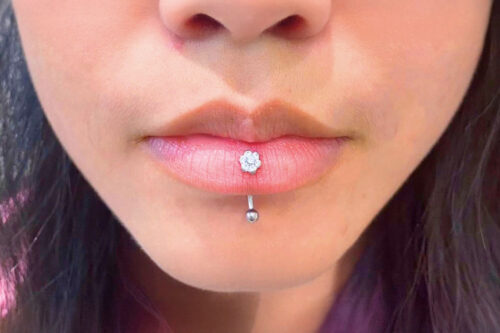All the Things To Know About Chigger Bites And How To Avoid Them
Chiggers are little monsters that may attack you any time you go for a walk in your garden or for a hike. That is why it is so essential that you are fully aware of what chigger bites are and how to avoid them, not to mention how to treat them. All this information we have compiled together in this article. Once you read through it, you will become a real chigger-bite pro!
Chiggers - What Are They?
To begin with, before identifying chigger bites, you need to be able to distinguish between chiggers and other bugs. Chiggers are very small red bugs, which turn yellow when they get some of your bodily fluids. They inhabit all the grassy areas and can even get inside your house. Very often, we do not notice them until our skin becomes red and itchy from their annoying bites. Chiggers are inactive if the temperature is lower than 16°C when the temperature goes as low as below 6°C chiggers die.
How Do Chiggers Bite Human?
Now, when you know what chiggers look like, it is time to learn how to identify chigger bites on humans. The fact is that chiggers attach themselves to human skin with the help of their claws. After that, they inject their saliva into the skin through their mouths. The enzyme in their saliva breaks the human cells into liquid form. In response, human body hardens the skin cells around the saliva, and that is how chiggers get the body fluids. The thing is that chiggers can feed off you for up to 5 days, after that they fall off on their own. One of the first symptoms that you should pay attention to is itchy skin. However, that is not the only symptom; there are more of them to distinguish. Read on to learn more.
Signs And Symptoms Of Chigger Bites
It is time we discuss what do chigger bites look like. These are the most common signs that you need to be aware of:
- Red bumps on your skin with a bright red dot in the center
- Groups of bumps that tend to grow with every day
- Bumps around your armpits, crotch, ankles, waist, or behind the knees
To tell you the truth, chigger bites themselves do not cause any serious conditions. However, as you tend to scratch your skin, this may lead to bleeding and even skin infections, which is already a serious condition. That is why you should be ready to treat bites the moment you spot them.
Prevention Of Chiggers Bites
Source: Elizaveta Galitckaia, Jay Ondreicka/ShutterstockChigger bite is the most expected during spring and fall months. Some areas highly contaminated with them. They are:
- High grass in fields and gardens
- Forests
- Areas around lakes and rivers
- Berry patches
- Beneath rocks
- Weeds
- Rodents infested areas
- Areas of high humidity
Of course, the best way to prevent chigger bites is to stay away from the mentioned above areas. However, that is not always a possibility. That is why it is advised that you use bug sprays that contain DEET when you are certain that you are going to visit chigger-infested areas. You need to use the spray on your skin as well as on the clothes.
Permethrin is proved to be the best spray suitable for clothing. It kills not only chiggers but also mosquitoes and ticks. However, you need to make sure that you spray your clothing with permethrin one or two days before putting them on.
There are also some other preventive methods that you can use. When you are about to go into areas with tall grass, make sure you wear trousers and high boots, besides, you should not forget to tuck your trousers into your socks. A long-sleeved shirt is a nice option too.
After you get out of the possible contaminated area, you should take the clothes off and wash them immediately. Besides, you yourself need to take a hot shower with a lot of scrubbing involved. If you follow these instructions, you can escape chigger bites and all the itchy aftermath that follows.
Treatment Chigger Bites
In case the prevention methods didn’t help, and you got yourself bitten, then it is essential that you know how to treat chigger bites. The fact is that many useful remedies can come in more than helpful when you are dealing with the issue.
- Anti-itch medication – it is available at any drug store and can help you greatly when it comes to dealing with the itching.
- Ice – in case you do not have access to the medication, try to place ice over the area to reduce the itching.
- Shower – hot showers will help you get rid of the chiggers that are left on the skin.
You can use these types of treatments as your anti-chigger bite first aid. However, there are also some home remedies for chigger bites as well. Read on to learn more!
Baking Soda
As you may already know, baking soda is simply irreplaceable when it comes to all sorts of inflammation that is why it great to treat chigger bites as well. Here is how you shod use it to reduce itching:
- Fill in a bath with warm water.
- Add a cup of baking soda to water.
- Let it dissolve.
- Take a bath for about 20 minutes.
- Repeat the process at least once a day for three days.
You can also make a paste out of baking soda and water and apply it to affected areas.
Vicks Vapor Rub
Vicks Vapor Rub can be used in treating chigger bites too. The thing is that it contains menthol, which in its turn possesses strong anti-inflammatory properties that can help you to reduce the swelling, inflammation, and itchiness. Here is how you should use it:
- Combine some Vicks Vapor Rub with a pink of salt.
- Mix well.
- Apply over affected areas.
- Repeat nightly.
Bleach Bath
Another chigger bites treatment involves bleach. The fact is that chlorine in bleach can make the bites dry faster as well as kill the remaining chiggers. Here is how you should use it:
- Fill in a bath with warm water.
- Add 1/4 cup of standard household bleach to the water.
- Take a bath for about 15 minutes.
It is best if you take such a bath right after you have been to chigger-infested areas.
Click NEXT PAGE below to know more about chigger bites treatment!
How To Treatment Chigger Bites
Tea Tree Oil
When it comes to how to get rid of chigger bites, tea tree, the essential oil is simply irreplaceable. The truth is that tea tree oil is highly valuable due to its anti-inflammatory properties. Besides, it has also antimicrobial properties so that you can not only reduce the itching but also prevent the infection from spreading. Here is how you should use it:
-
- Soak a cotton pad in tea tree essential oil.
- Apply the oil to the affected areas.
- Repeat the procedure twice a day.
Lavender Oil
Lavender oil is also helpful when it comes to dealing with chigger bites. It possesses anti-inflammatory and analgesic properties, which reduce the itching as well. Here is how you should use it:
-
-
-
- Soak a cotton pad in lavender essential oil.
- Apply the oil to the affected areas.
- Leave it one until it dries out.
- Repeat up to three times a day.
-
-
Epsom Salt
Magnesium in Epsom salt has anti-inflammatory properties too. That is why it is also used when it comes to dealing with chigger bites. Here is how you should use it:
-
-
-
- Fill in a bath with water.
- Add a cup of Epsom salt to the water.
- Take a bath for about 20 minutes.
- Repeat daily for a week.
-
-
Rubbing Alcohol
Apart from the fact that rubbing alcohol can protect the affected area from further infection, it can also soothe the itching. Here is how you should use it:
-
-
-
- Soak a cotton pad in rubbing alcohol.
- Place the pad over the affected area.
- Leave it on.
- Repeat the procedure for as long as necessary.
-
-
Apple Cider Vinegar
There are many conditions that apple cider vinegar can help you deal with, and chigger bites are not the exception. The thing is that apple cider vinegar can help you neutralize the affected area so that the itching is relieved. Here is how you should use it:
-
-
-
- Soak a cotton pad in apple cider vinegar.
- Apply the pad to the affected areas.
- Leave it on until the pad dries out.
- Repeat the procedure twice a day.
-
-
Nail Polish Remover
Using nail polish remover may seem odd. However, it is proved to be useful when it comes to dealing with chigger bites. The thing is that that nail polish remover not only helps to dislodge chiggers but also stops the itching. Yet, you need to be aware of the fact that if your skin is too sensitive, you should in no case use this remedy.
Here is how you should use it:
-
-
-
- Soak a cotton pad in nail polish remover.
- Apply the pad to the affected areas.
- Leave it on until the pad dries out.
- Repeat the procedure twice a day.
-
-
Hydrogen Peroxide
The truth is that antiseptic properties of hydrogen peroxide are useful when it comes to destroying the chigger enzymes that make your skin itch. Here is how you should use it:
-
-
-
- Combine two tablespoons of 3% hydrogen peroxide and water.
- Soak a cotton pad in the solution.
- Apply the pad to the affected areas.
- Leave it on until the pad dries out.
- Repeat the procedure twice a day.
-
-
Oatmeal Bath
Not everyone may know, but oatmeal is highly requested in dermatology. The thing is that oatmeal can treat such skin conditions as acne, pruritus, and atopic dermatitis. That is why it comes useful against chigger bites as well. Here is how you should use it:
-
-
-
- Fill in a bath with warm water.
- Add a cup of ground oatmeal to the water.
- Soak in it for about 20 minutes.
- Repeat the procedure once a day.
-
-
Coconut Oil
Coconut oil has many beneficial properties, so that chigger bites are the condition it deals well with too. The thing is that coconut oil is good against swelling and itchiness. Besides, it keeps your skin well-moisturized. Here I show you should use it:
-
-
-
- Apply a few drops of coconut oil to the affected areas.
- Leave it on.
- Repeat the procedure twice a day.
-
-
Toothpaste
That fact that toothpaste is pretty minty makes it useful when it comes to relieving the itchiness caused by chigger bites. Here is how you should use it:
-
-
-
- Apply some toothpaste over the affected areas.
- Leave in on until it dries out.
- Wash it off with warm water.
- Repeat the procedure twice a day.
-
-
Other Biting Insects And Bugs To Look Out For
No matter how unpleasant it may sound, but chiggers are not the only bugs to be aware of. The thing is that there are several other biting insects that you should know.
-
-
-
- Ticks: they can be found in plants and bushes. In most cases, their bites are merely unpleasant, but there are also rare cases when they transmit Lyme disease, and Rocky Mountain spotted fever.
- Scabies: they cause itching as well. Scabies spread when you contact with a person infected by the mites.
- Bed bugs: as the name suggests it, they can be found in beds and old furniture. They leave small itching lumps after themselves on your skin.
- Fleas: these insects can attach both pets and people. They such your blood and leave small itchy lumps on your skin.
- Mosquitoes: are well-known flying insects that can not only bite you and make your skin itch, they can also transmit serious diseases.
- Fire ants: these ants can sting you when you come across them, and their sting is very painful, what is more, the mark they leave will also itch and besides it can turn into pus-filled blisters in some cases.
-
-
Chigger bites are what you should be aware of when the summer season hits. That is why we have gathered here the information on how to identify the bite, treat it, and even prevent it!
FAQ: Chigger Bites
Where do chiggers live?
Chiggers do not live in every sort of dwelling, despite their extensive spread. They prefer to live in overgrown, moist regions such as meadows and grasslands, as well as amid the leaf litter on the forest floor. However, chiggers can still be seen in more well-kept grassy areas (parks, lawns etc.).
Can chigger bites spread?
Chigger bites are not contagious since they only appear where the mites have bitten a person. As a result, chigger bites cannot be transmitted from one person to another.
How long do chiggers live on you?
Chiggers can only survive on people for four days on average. Chigger larvae cling to the skin of their hosts but do not burrow into it. Itching from a chigger bite doesn’t start for three hours or more after the bite.
Was this article helpful?





